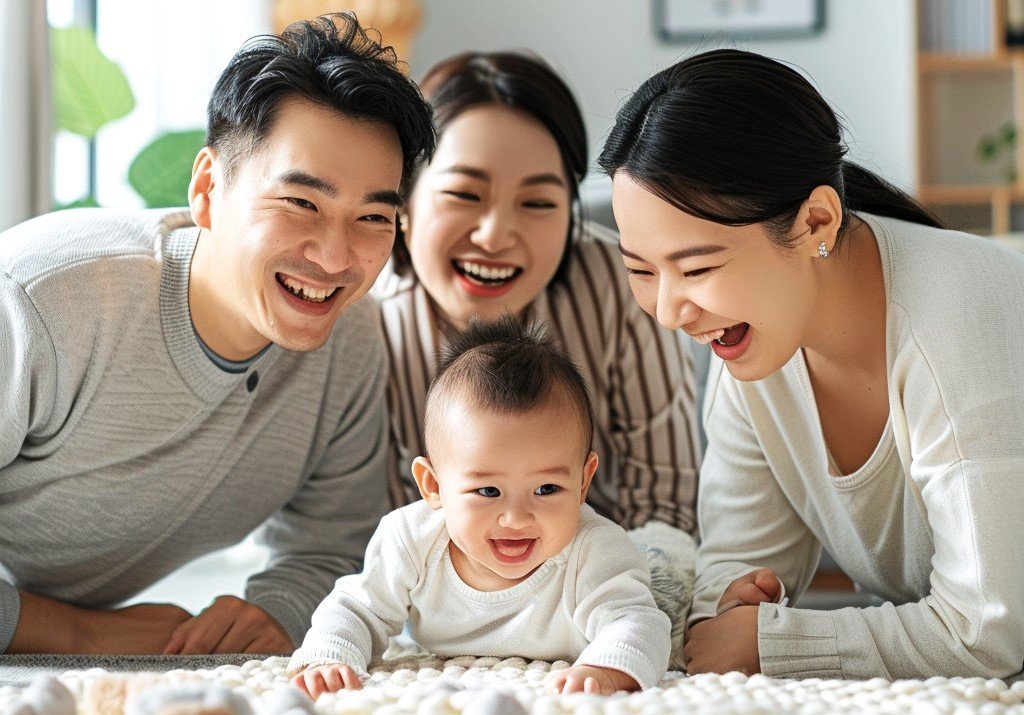Chinese Postpartum Care is a unique tradition focused on helping new mothers recover after giving birth. Here’s a guide that offers a clear, engaging look at how birthing parents deal with Postpartum Care using the practice.
Chinese Postpartum Care: A Gentle Path to Recovery
After months of pregnancy and the work of delivery, every new mom deserves time to rest and heal. In Chinese culture, the period of rest and recovery is called “zuo yue zi” or “sitting the month.” Practiced for over two thousand years, Chinese Postpartum Care, rooted in Chinese confinement practices that originated as a protective measure for mothers in a traditional agrarian society, has grown with modern perspectives.
Zuo Yue Zi is considered a It’s a time of rest, nourishment, and physical and emotional care, based on conventional Chinese Medicine (TCM) principles. Let’s explore what makes the ancient approach to Postpartum Care so unique.
What is Chinese Postpartum Care?
Chinese Postpartum Care, or “zuo yue zi,” is designed to allow new mothers the chance to fully recover. The name itself, “sitting the month,” reflects the idea that the first month after childbirth is a period for complete rest and healing.
For centuries, mothers have followed the practices of avoiding strenuous activity, nourishing their bodies with healthy foods, and getting assistance from family and professional caregivers. According to conventional Chinese Medicine (TCM), the approach restores the body’s balance, rebuilds energy, and improves blood flow—the key to recovering from the demands of childbirth.

In Chinese culture, giving birth is considered both a beautiful and intense experience, and the mother’s body is viewed as being in a delicate, sensitive state afterward. That’s why “zuo yue zi” focuses on careful, intentional care. From resting to eating nutrient-rich meals, Chinese Postpartum Care rebuilds strength in body and mind.
Why is Chinese Postpartum Care Important?
Chinese Postpartum Care is grounded in principles that prioritize full recovery for the mother. Here’s why the principles are considered ever-green:
- Physical Healing: After birth, a new mother’s body needs to rebuild strength and blood volume, heal any birth-related injuries, and increase energy. The focus on warm, nourishing foods and rest supports that recovery.
- Mental and Emotional Support: The demands of caring for a newborn sometimes get emotionally overwhelming. Chinese Postpartum Care emphasizes emotional support from family, which reduces feelings of isolation and lessens the chance of postpartum depression.
- Promoting Breastfeeding: Warm, nutritious meals, like papaya fish soup, support healthy milk production for breastfeeding mothers. Breast milk provides key nutrients and builds immunity for the baby.
How Long is the Confinement Period?
Postpartum women are typically viewed as vulnerable to various health issues during the “confinement” or postpartum period, which lasts about 30 to 40 days or approximately one month. In some cases, if the mother had a C-section or if there are other health needs, the period might be extended up to 6 weeks.
Health experts suggest that full postpartum recovery could take up to two years, so the first month really sets the stage for long-term healing. In that time, mothers are advised to avoid outdoor activities, limit visitors, and focus on low-stress routines.
Key Practices During “Zuo Yue Zi”
Several core practices make up conventional Chinese Postpartum Care, each one crafted for new moms’ health and well-being. Here are some of the main ones:
- Rest and Recovery: Physical rest is a cornerstone of Chinese Postpartum Care. It allows new moms to avoid exhaustion and gives the body the time it needs to heal.
- Warm Foods: conventional Chinese diets during confinement focus on warm, easy-to-digest foods, like soups and stews. Cold and spicy foods are avoided as they are thought to interfere with the body’s recovery.
- Limiting Physical Activities: New mothers are encouraged to avoid strenuous activities and minimize daily tasks like cleaning or cooking. Some mothers hire a “confinement nanny” or get assistance from family members for the tasks.
- Avoiding Cold Water: In conventional Chinese practices, cold water and hair washing are discouraged. The aim is to keep the mother’s body warm and avoid the “cold” element, which is believed to hinder recovery. Many women adhere to the practices due to cultural beliefs surrounding hygiene and dietary restrictions, influenced by familial and societal expectations.
Family Support Counts For Much

Family support is a key part of Chinese Postpartum Care. Often, relatives or a confinement nanny performs daily tasks and baby care, which lets the mother focus on her recovery.
The recovery period is a time for close family to bond and support the mother emotionally and physically.
Nourishment and Healing Foods
A major part of postpartum recovery is eating foods that boost energy and support healing. Here are some conventional Chinese postpartum foods:
- Ginger Vinegar Pigs’ Feet: Rich in nutrients and warming ingredients believed to boost energy and circulation.
- Papaya Fish Soup: Known to support milk production, papaya fish soup is popular during the confinement period.
- Chicken with Sesame Oil: Chicken is cooked in sesame oil for its warming and nourishing properties.
Conventional meals are often prepared with warming herbs and foods, such as ginger and sesame oil. The ingredients are believed to expel “wind” from the body, strengthen the joints, and improve circulation.
The Importance of Traditional Chinese Medicine (TCM)
TCM views childbirth as an experience that leaves the mother’s body in a “cold” and weakened state. To counteract that, TCM recommends warm, energy-boosting foods and herbal remedies to restore balance. Popular herbs like ginseng and goji berries are often included in meals, as they are believed to support energy, blood circulation, and overall recovery.
Adapting Conventional Practices for Modern Life
Nowadays, many new moms blend conventional Chinese postpartum practices with modern Postpartum Care. For example, mothers may follow conventional dietary rules but consult with healthcare providers about what’s best for their recovery.
Other moms might avoid cold foods or drinks for the first few weeks but allow themselves occasional breaks to fit personal comfort and lifestyle. It’s becoming more common to find people balancing conventional confinement practices with modern support systems like doctors, nurses, and postpartum doulas.
Chinese women often balance adherence to ‘doing-the-month’ rituals with modern medical advice and family support.
Dr. Kristal Lau’s Approach to Postpartum Care
Dr. Kristal Lau, a leading postpartum wellness expert, believes that each mother’s story is unique. She encourages new moms to balance conventional Postpartum Care with modern healthcare insights, creating a recovery plan tailored to individual needs.
Her approach allows new mothers to honor cultural traditions while also meeting their personal health needs.
FAQs
Should I exercise or have sex during the confinement period?
It’s best to avoid both exercise and sex during the first 30 to 40 days. The body is healing, and engaging in such activities too soon could interrupt your recovery. Always check with a healthcare provider to know when it’s safe to resume.
What foods should I eat during “zuo yue zi”?
Warm, nutrient-rich foods like chicken, fish soups, and rice are recommended. Avoid raw or cold foods, as they’re thought to slow recovery. Focus on meals that support energy and milk production.
Do I really need to avoid washing my hair?
conventionally, washing hair is avoided to keep the body warm. However, many modern mothers choose to wash their hair using warm water, as long as they stay warm afterward.
Is hiring a confinement nanny necessary?
Hiring a confinement nanny is optional. While they provide valuable help with cooking, cleaning, and baby care, some women prefer relying on family support or managing the care on their own.
